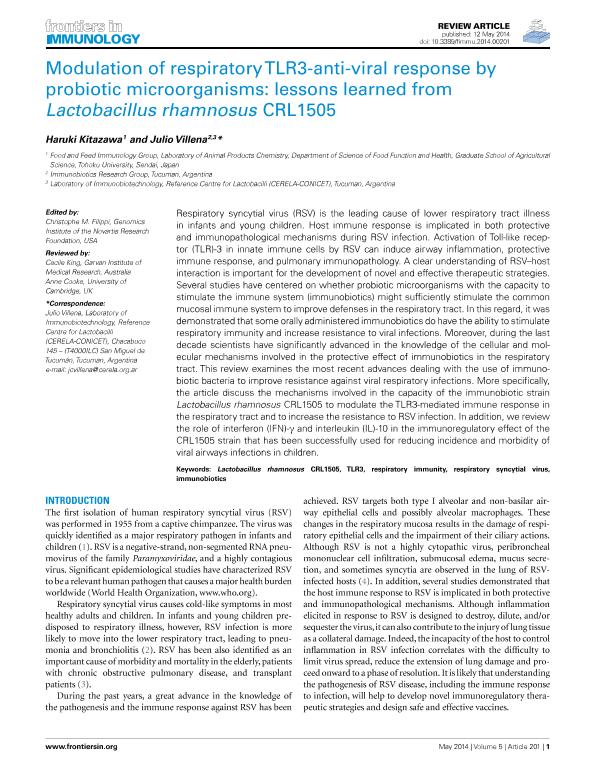Mostrar el registro sencillo del ítem
dc.contributor.author
Kitazawa, Haruki

dc.contributor.author
Villena, Julio Cesar

dc.date.available
2015-11-13T14:40:09Z
dc.date.issued
2014-05-12
dc.identifier.citation
Kitazawa, Haruki; Villena, Julio Cesar; Modulation of respiratory TLR3-anti-viral response by probiotic microorganisms: lessons learned from Lactobacillus rhamnosus CRL1505; Frontiers Res Found; Frontiers Immunology; 5; 201; 12-5-2014; 1-15
dc.identifier.issn
1664-3224
dc.identifier.uri
http://hdl.handle.net/11336/2778
dc.description.abstract
Respiratory syncytial virus (RSV) is the leading cause of lower respiratory tract illness in infants and young children. Host immune response is implicated in both protective and immunopathological mechanisms during RSV infection. Activation of Toll-like recep- tor (TLR)-3 in innate immune cells by RSV can induce airway inflammation, protective immune response, and pulmonary immunopathology. A clear understanding of RSV?host interaction is important for the development of novel and effective therapeutic strategies. Several studies have centered on whether probiotic microorganisms with the capacity to stimulate the immune system (immunobiotics) might sufficiently stimulate the common mucosal immune system to improve defenses in the respiratory tract. In this regard, it was demonstrated that some orally administered immunobiotics do have the ability to stimulate respiratory immunity and increase resistance to viral infections. Moreover, during the last decade scientists have significantly advanced in the knowledge of the cellular and mol- ecular mechanisms involved in the protective effect of immunobiotics in the respiratory tract. This review examines the most recent advances dealing with the use of immuno- biotic bacteria to improve resistance against viral respiratory infections. More specifically, the article discuss the mechanisms involved in the capacity of the immunobiotic strain Lactobacillus rhamnosus CRL1505 to modulate the TLR3-mediated immune response in the respiratory tract and to increase the resistance to RSV infection. In addition, we review the role of interferon (IFN)-γ and interleukin (IL)-10 in the immunoregulatory effect of the CRL1505 strain that has been successfully used for reducing incidence and morbidity of viral airways infections in children.
dc.format
application/pdf
dc.language.iso
eng
dc.publisher
Frontiers Res Found

dc.rights
info:eu-repo/semantics/openAccess
dc.rights.uri
https://creativecommons.org/licenses/by-nc-sa/2.5/ar/
dc.subject
IMMUNOBIOTICS
dc.subject
LACTOBACILLUS RHAMNOSUS CRL1505
dc.subject
RESPIRATORY IMMUNITY
dc.subject
RESPIRATORY SYNCYTIAL VIRUS
dc.subject
TLR3
dc.subject.classification
Inmunología

dc.subject.classification
Medicina Básica

dc.subject.classification
CIENCIAS MÉDICAS Y DE LA SALUD

dc.title
Modulation of respiratory TLR3-anti-viral response by probiotic microorganisms: lessons learned from Lactobacillus rhamnosus CRL1505
dc.type
info:eu-repo/semantics/article
dc.type
info:ar-repo/semantics/artículo
dc.type
info:eu-repo/semantics/publishedVersion
dc.date.updated
2016-03-30 10:35:44.97925-03
dc.journal.volume
5
dc.journal.number
201
dc.journal.pagination
1-15
dc.journal.pais
Suiza

dc.journal.ciudad
Lausanne
dc.description.fil
Fil: Kitazawa, Haruki. Tohoku University. Graduate School of Agricultural Science. Laboratory of Animal Products Chemistry. Food and Feed Immunology Group; Japón
dc.description.fil
Fil: Villena, Julio Cesar. Consejo Nacional de Investigaciones Científicas y Técnicas. Centro Científico Tecnológico Tucumán. Centro de Referencia para Lactobacilos (i); Argentina
dc.journal.title
Frontiers Immunology
dc.relation.alternativeid
info:eu-repo/semantics/altIdentifier/doi/http://dx.doi.org/10.3389/fimmu.2014.00201
dc.relation.alternativeid
info:eu-repo/semantics/altIdentifier/url/https://www.frontiersin.org/articles/10.3389/fimmu.2014.00201/full
Archivos asociados
